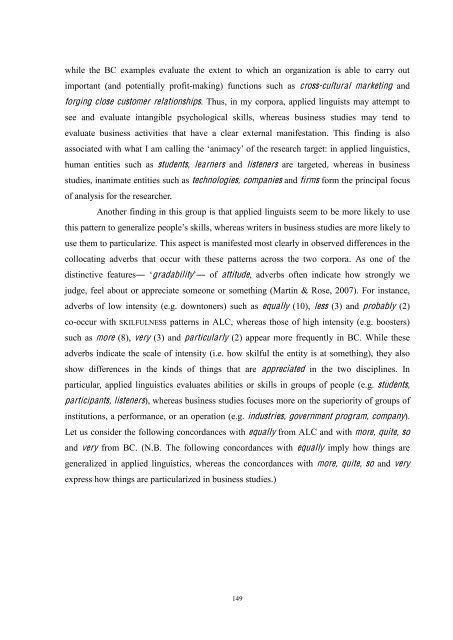Evaluative Meanings and Disciplinary Values - eTheses Repository ...
Evaluative Meanings and Disciplinary Values - eTheses Repository ...
Evaluative Meanings and Disciplinary Values - eTheses Repository ...
Create successful ePaper yourself
Turn your PDF publications into a flip-book with our unique Google optimized e-Paper software.
while the BC examples evaluate the extent to which an organization is able to carry out<br />
important (<strong>and</strong> potentially profit-making) functions such as cross-cultural marketing <strong>and</strong><br />
forging close customer relationships. Thus, in my corpora, applied linguists may attempt to<br />
see <strong>and</strong> evaluate intangible psychological skills, whereas business studies may tend to<br />
evaluate business activities that have a clear external manifestation. This finding is also<br />
associated with what I am calling the animacy of the research target: in applied linguistics,<br />
human entities such as students, learners <strong>and</strong> listeners are targeted, whereas in business<br />
studies, inanimate entities such as technologies, companies <strong>and</strong> firms form the principal focus<br />
of analysis for the researcher.<br />
Another finding in this group is that applied linguists seem to be more likely to use<br />
this pattern to generalize skills, whereas writers in business studies are more likely to<br />
use them to particularize. This aspect is manifested most clearly in observed differences in the<br />
collocating adverbs that occur with these patterns across the two corpora. As one of the<br />
distinctive features gradability of attitude, adverbs often indicate how strongly we<br />
judge, feel about or appreciate someone or something (Martin & Rose, 2007). For instance,<br />
adverbs of low intensity (e.g. downtoners) such as equally (10), less (3) <strong>and</strong> probably (2)<br />
co-occur with SKILFULNESS patterns in ALC, whereas those of high intensity (e.g. boosters)<br />
such as more (8), very (3) <strong>and</strong> particularly (2) appear more frequently in BC. While these<br />
adverbs indicate the scale of intensity (i.e. how skilful the entity is at something), they also<br />
show differences in the kinds of things that are appreciated in the two disciplines. In<br />
particular, applied linguistics evaluates abilities or skills in groups of people (e.g. students,<br />
participants, listeners), whereas business studies focuses more on the superiority of groups of<br />
institutions, a performance, or an operation (e.g. industries, government program, company).<br />
Let us consider the following concordances with equally from ALC <strong>and</strong> with more, quite, so<br />
<strong>and</strong> very from BC. (N.B. The following concordances with equally imply how things are<br />
generalized in applied linguistics, whereas the concordances with more, quite, so <strong>and</strong> very<br />
express how things are particularized in business studies.)<br />
149
















